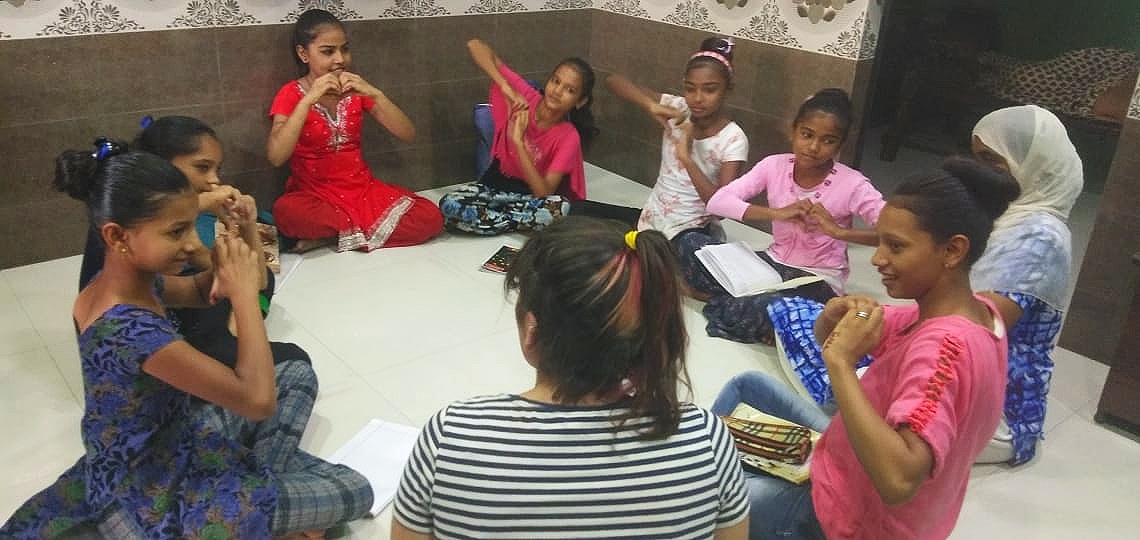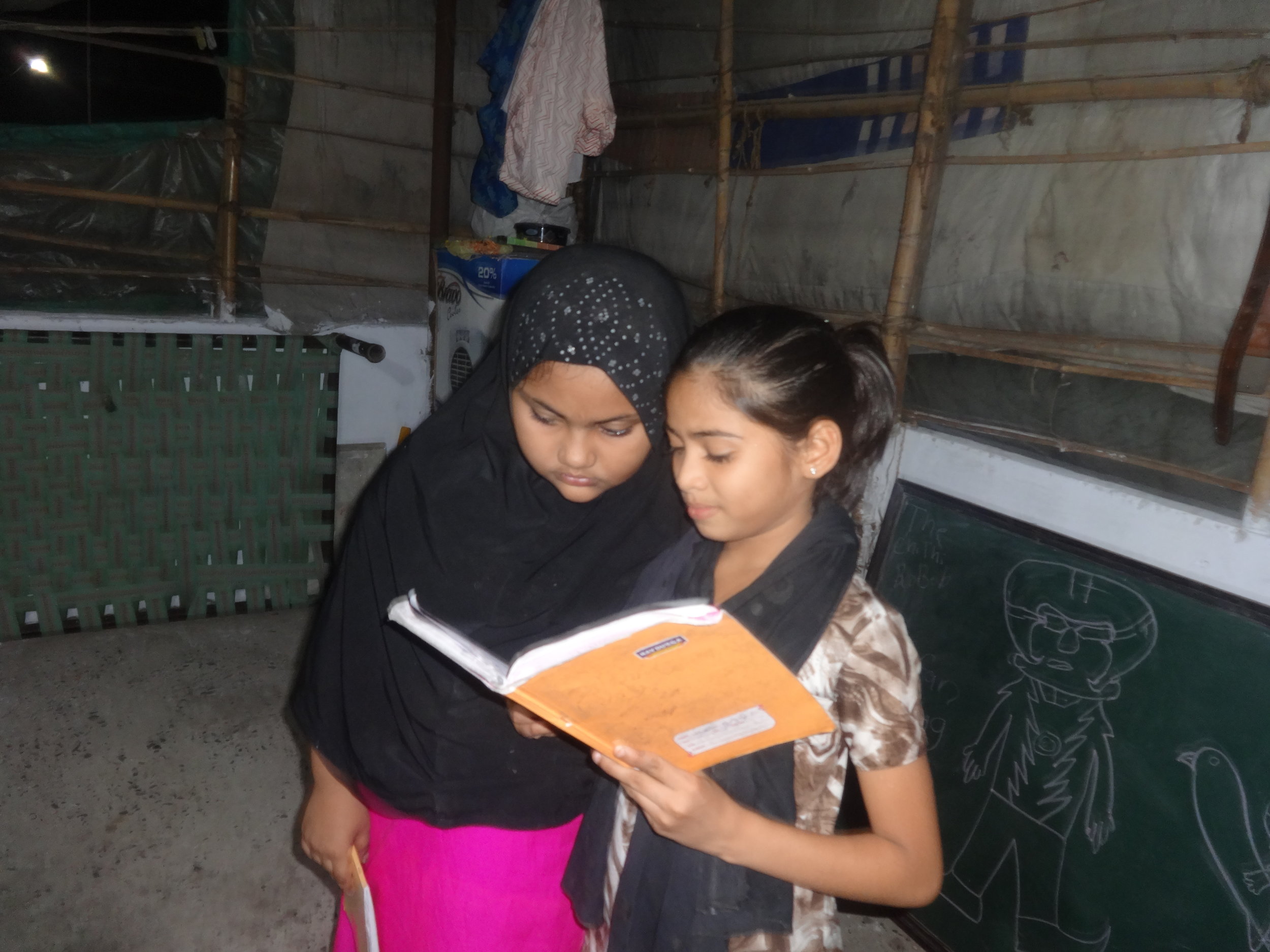Program Innovation Coordinator Steph Alkhatib with mentor Sajeda and LitClub members
On May 17th, 2019, Steph Alkhatib, LitWorld’s Program Innovation Coordinator, visited one of our long-time partners, the Centre for Development in Ahmedabad, in the state of Gujarat, in western India. The following are her reflections and memories of a day spent with amazing LitKids and staff of CfD.
Hold on tight for that rickshaw ride!
On Friday morning, I arrived at the CFD office and was greeted by Komal, a recent 12-standard graduate and member of the Kadam Resource Centre for girls, as well as Meera and Prasad, the Directors of the organization and Partnership Coordinators between CFD and LitWorld.
They explained that CFD works mostly with Muslim and Dalit communities in Ahmedabad. The city’s communities are pretty segregated; there’s a history of persecution and inequality between Hindus and Muslims in the city. One side of the city is modern and predominantly owned by Bramhan Hindus (the highest Hindu caste), who won’t rent or sell to those from lower casts or Muslims. The other side is old city, rich in culture but unfortunately poor in opportunity, where most Muslim and Dalit (‘Untouchables’, the lowest Hindu caste) communities are. Meera explained that these communities tend to be very conservative; the gender disparity is huge, child marriage does exist, girl children are unwanted, don’t leave the house for extended periods of time and their education is low priority.
While Meera and I started our journey around old city via auto(rickshaw), she gave me a little background on the LitClubs. They have 16 clubs, 12 girls’ and 4 boys’ clubs. Some have been running up to 4 years, and often mentors run several clubs.
We pulled up to a neighborhood where two girls’ LitClubs were meeting in a first floor room. I also met the senior mentor Sajeda there, who joined us for the day and was very kind and helpful with translating and getting around!
The LitClubs greeted me with the Hello song! Each club sat in a circle as they worked on art projects where they used recycled materials to create objects: a bed, purse, lanterns, tiny suitcase - all made from recycled paper, cardboard and fabric. It was truly creative. I asked a few questions about their favorite activities, and something they learned from LitClub, and I heard some amazing replies. Several girls mentioned that their demeanor had changed; before LitClub, they were very withdrawn, and now they felt confident. A girl said she was very aggressive with her family before LitClub, and now she gets along with them well.
LitClub members welcome Steph with the Hello song
A younger girl told a story of action she took in her community after gaining courage from her LitClub. She said before LitClub, there was a problem with water access in her community. After LitClub she gained courage to get her family and community to talk to the municipality about fixing the problem.
After leaving, Meera shared that these stories are common. She’s seen remarkable change in all of the children in LitClubs over the years. Due to the repression kids experience in their homes, they often join LitClubs as either withdrawn or aggressive individuals. After some time being supported by mentors and building relationships with the other girls or boys, they begin to open up and get comfortable with themselves and others.
Proud LitClub member ❤️
Next, we visited a LitClub in Khodi Nagar, a Dalit community. Meera mentioned that Dalit people are often treated very unfairly by other castes, like ‘less than human’. She said one of the benefits of LitClub meetings in this community is that the members learn about two Dalit advocates, helping them recognize that they, too, deserve human rights.
When talking with the children, a girl named Dimple shared that she is excited to start school this year and do well. Also, she went to her uncle’s house to motivate others to go to school as well. She likes LitClubs because they have given her courage and confidence. Go Dimple!
We left Khodi Nagar to head to Meera’s home, where she hosted us for lunch. Prasad told me about the difficulties they have in finding adequate stories for the LitClubs. Most stories available are either fables based around singular 'morals', stories translated from another language with unrelatable context, or more violent folk-tales that represent problematic gender, class, or violence norms.To address this challenge, a few years ago CFD had a retreat with the mentors, where they wrote hundreds of short stories and are now able to use those stories in LitClubs.
After lunch, we headed to Mumbai Hotel to visit a boys’ LitClub. The boys were sweet and very reserved while meeting me. We bonded about biryani though--it’s my favorite dish and during Ramadan, Muslim communities often eat it after breaking fast at night. The boys shared that they liked the ‘Stand Up for Girls’ event, where they learned that either a boy or a girl can do any household job or have any career. A boy named Rohit shared that the day before, a girl from his neighborhood had gone missing, and he and his friend went out, found her and brought her home; Meera mentioned that this sense of community was cultivated by mentorship at LitClubs.
Sharing the Check-in Question with a LitClub friend
Next, we visited a community located nearby to a massive, at least 1x1 square km trash pile hosting all of Ahmedabad’s garbage, where Meera said the kids sometimes play or collect scrap metal to sell. The community has both a boys’ and a girls’ LitClub. The girls were playing and hanging around outside while the boys’ club was going on. The boys were working on what I believe was a ‘Curiosity Commercials’ activity--they had some great illustrations!
“LitClubs have created a space where the children feel comfortable asking her questions. They come to her with questions all the time. There are a lot of things children wonder about, but in more conservative communities, some subjects—such as marriage, relationships, or gender roles—are taboo to question. Parents, relatives, or friends may reject such questions, not know the answer, or give an answer that perpetuates restrictive societal norms.”
I asked the group mentor, Rajini, her thoughts on LitClubs--what’s working, and anything she’d like to change. She had a powerful response: LitClubs have created a space where the children feel comfortable asking her questions. They come to her with questions all the time. There are a lot of things children wonder about, but in more conservative communities, some subjects--such as marriage, relationships, or gender roles--are taboo to question. Parents, relatives, or friends may reject such questions, not know the answer, or give an answer that perpetuates restrictive societal norms.
Children’s Day Artwork from the LitClubs
This narrative was very satisfying to hear for a few reasons. One, Prasad had mentioned earlier that adolescents in these communities struggle to navigate relationships; they don’t hear about or may not see healthy relationships, and often get into something unsafe or unhealthy, sometimes resulting in cheating, beating, eloping, or suicidal tendencies post-breakup. Having a receptive, open-minded adult to speak to about such topics can be life-changing for the adolescents in these communities. Secondly, since starting at LitWorld, a great concern and interest of mine has been LitWorld’s role in developing and ensuring that LitClub mentors are supporters and advocates of club members. I’ve wondered: are we offering enough training and support, what more could we do? After the success stories I heard and saw, however, I feel convinced that CFD and its mentors are doing an amazing job creating safe spaces for kids to learn, grow, and experience pure joy.
We left this community to visit 2 more LitClubs. Since it’s school break, many people were out of town, visiting their home villages 100 km away. Trupti--who also mentored the second group I visited--led the girls in some songs. This meeting was more laid back, so I asked the girls some casual questions, about their hobbies, some things they like to do outside of LitClubs and school or their job aspirations. The girls were reluctant to answer at first but after I encouraged them to think outside of their circumstances they eventually shared a few careers: scientist, social studies teacher and lots of aspiring teachers in general. Trupti asked me a few questions about the US and the gender roles there--I shared that although women have more opportunities there, there’s still wage and political representation disparities.
As I was getting ready to leave, feeling contemplative and inspired, a young LitClub member asked me, ‘if we get the chance, should we leave and travel?’. After a moment of reflection I told her that I thought that every time you visit a new place, you meet people who live and think different ways. Every new place teaches you something new about the world.







